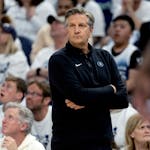D'Angelo Russell might have been able to hold off surgery until the offseason, when doctors could have cleaned out his knee without his missing any games.
That would have meant Russell playing through the season at less than 100%, and as he said recently, sometimes your body speaks to you.
"My body told me I really couldn't physically be out there helping the team," he said. "So I think it was the right decision to get it done, and we'll see where it goes."
The decision came with a cost — Russell missed 26 games. But the upside is that he's fully healthy now and getting to play with Karl-Anthony Towns while fully healthy.
Finally, the Wolves are getting a glimpse of what they envisioned when they made a deal with Golden State, Thursday's opponent at Target Center, to bring Russell here in exchange for Andrew Wiggins and a top-three-protected draft pick.
That pick has been a source of recent consternation for fans on social media because the Wolves have started to win games at an inconvenient time for some. The Wolves have the second-worst record in the league and could lessen their odds of earning a top-three pick with each win.
One reason they have been winning games is because of Russell, with the Wolves going 9-6 this season when Russell and Towns share the floor together.
Russell's numbers also display the effects of being healthy. Before the injury, Russell had a true-shooting percentage, a metric which takes into account the value of three-pointers and free throws, of 54.4%. Since his return that number has jumped to 61.2%, which ranks in the top 40 in the NBA since the All-Star break for players averaging more than 20 minutes per game and attempting more than eight shots.
It puts him in the company of star players like Joel Embiid (61.8%), Donovan Mitchell (60.3), Kyrie Irving (59.9), Jayson Tatum (59.9) and Luka Doncic (60.2). Before the All-Star break Russell didn't crack the top 100 given those qualifiers. For reference, Towns is 61.9% since the break.
"My body feeling the way it feels has a lot to do with my individual success," Russell said.
The Wolves have been careful in managing Russell's workload. At first he was on a minutes restriction in the neighborhood of 24 per night. That recently increased to around 30. Russell still hasn't been starting and instead has come off the bench to anchor the second unit. It also frees him to play down the stretch of close games if he sits out earlier in the game instead of later.
"I didn't have to repair anything as far as my injury went, so I think that was the best over everything," Russell said. "So just taking that small timeout, taking care of it right away, I think that was the smartest thing to do vs. letting it linger and it getting worse than what it could've been."
When Russell first returned, coach Chris Finch said he was hoping as Russell got healthier he'd be able to pick up the pace on offense. Nearly four weeks into Russell's comeback, Finch has said the pace is where he wants it.
"He's getting it up there and also when he doesn't have the ball in his hands, he's getting ahead of the play," Finch said. " ... He can play at all paces so he has a good knack for when to slow the game down and when to insert himself a little bit more in it and when to include his teammates."
Finch added he was targeting Russell and Towns to play together around 20 minutes per night.
Defense will always be the biggest question mark with Russell, as it is for this entire team. That will be something the Wolves needs to address in the offseason and next year in training camp across the board. For now, they have a healthy Russell back and are finally getting to see their vision play out on the offensive end.





